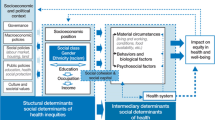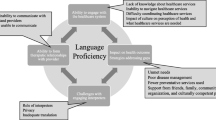Abstract
Confusion around health insurance reforms persist. The purpose of this study was to assess demographic differences in Affordable Care Act (ACA) and health insurance knowledge in a multi-ethnic urban sample. Data came from 243 adults from racial/ethnic communities. Participants were asked about elements of health insurance and the ACA. Generalized linear and logistic regression models were used to examine relationships between demographic predictors and knowledge domains. Female gender (p < 0.05) and Latino/Hispanic race/ethnicity (p < 0.001) were most predictive of lower eligibility knowledge, while non-citizen with residency status (p < 0.001) and other/not declared residency status (p < 0.001) were most predictive of lower insurance coverage knowledge. No demographic factors predicted enrollment knowledge. Latino/Hispanic race/ethnicity (p < 0.01) was most predictive of not knowing that more people can get insurance because of the ACA. In conclusion, there is variation in health insurance and ACA-related knowledge in multi-ethnic populations. More compatible health communication interventions are needed to support outreach to key demographic groups.

Similar content being viewed by others
References
Centers for Disease Control and Prevention. Uninsured rate among the nonelderly population, 1972-2018. National Center for Health Statistics: 2018. http://www.cdc.gov/nchs/health_policy/trends_hc_1968_2011.htm#table01 and https://www.cdc.gov/nchs/data/nhis/earlyrelease/Insur201808.pdf. Accessed 24 Jan 2018.
Kaiser Family Foundation. 5 misconceptions surrounding the ACA: 2017. https://www.kff.org/health-reform/poll-finding/data-note-5-misconceptions-surrounding-the-aca/). Accessed 24 Jan 2018.
Hoerl M, Wuppermann A, Barcellos SH, Bauhoff S, Winter JK, Carman KG. Knowledge as a predictor of insurance coverage under the Affordable Care Act. Med Care. 2017;55(4):428–35.
Edward J, Morris S, Mataoui F, Granberry P, Williams MV, Torres I. The impact of health and health insurance literacy on access to care for Hispanic/Latino communities. Public Health Nurs. 2018;35(3):176–83.
The Century Foundation. Examining health literacy in the ACA: 2016. https://tcf.org/content/commentary/examining-health-literacy-aca/?agreed=1&agreed=1. Accessed 24 Jan 2018.
Levitt L. Why health insurance literacy matters. JAMA. 2015;313(6):555–6.
Martinez RN, Gordon EJ, Tully S, et al. A Mixed-methods study of veterans affairs providers’ experiences communicating with patients about the Affordable Care Act. Mil Med. 2017;182(5):e1715–23.
Petrany SM, Christiansen M. Knowledge and perceptions of the Affordable Care Act by uninsured patients at a free clinic. J Health Care Poor Underserved. 2014;25(2):675–82.
Tsiang JT, Lam HT, Woo BK. Affordable Care Act knowledge and publicity in the older Chinese-American population. J Am Geriatr Soc. 2014;62(11):2219–21.
Doty MM, Rasmussen PW, Collins SR. Catching up: Latino health coverage gains and challenges under the Affordable Care Act: results from the Commonwealth Fund Affordable Care Act Tracking Survey. Issue Brief (Commonw Fund). 2014;26:1–15.
Ghaddar S, Byun J, Krishnaswami J. Health insurance literacy and awareness of the Affordable Care Act in a vulnerable Hispanic population. Patient Educ Couns. 2018;101(12):2233–40.
Tilley L, Yarger J, Brindis CD. Young adults changing insurance status: gaps in health insurance literacy. J Commun Health. 2018;43(4):680–7.
Ali NM, Combs RM, Muvuka B, Ayangeakaa SD. Addressing health insurance literacy gaps in an urban African American Population: a qualitative study. J Commun Health. 2018;43:1205–1216.
Patel MR, Israel BA, Song PXK, et al. Insuring Good Health: Outcomes and acceptability of a participatory health insurance literacy intervention in diverse urban communities. Health Educ Behav. 2019;46:494–505.
Barcellos SH, Wuppermann AC, Carman KG, Bauhoff S, McFadden DL, Kapteyn A, Winter JK, Goldman D. Preparedness of Americans for the Affordable Care Act. Proc Natl Acad Sci USA. 2014;111(15):5497–502.
Henry J Kaiser Family Foundation (March 2013) Kaiser Health Tracking Poll [Internet]. http://kaiserfamilyfoundation.files.wordpress.com/2013/03/8425-t1.pdf.
National Academy of Medicine. Health Literacy: 2012. http://nationalacademies.org/hmd/~/media/Files/Activity%20Files/PublicHealth/HealthLiteracy/Commissioned%20Papers%20-Updated%202017/Parker%20et%20al%202015%20Engaging%20hardtoreach%20populations.pdf. Accessed 24 Jan 2018.
Owens GM. Gender differences in health care expenditures, resource utilization, and quality of care. J Manag Care Pharm. 2008;14(3 Suppl):2–6.
Vaidya V, Partha G, Karmakar M. Gender differences in utilization of preventive care services in the United States. J Womens Health (Larchmt). 2012;21(2):140–5.
Kaiser Family Foundation. Women’s Coverage, Access, and Affordability: Key Findings from the 2017 Kaiser Women’s Health Survey: 2017. https://www.kff.org/womens-health-policy/issue-brief/womens-coverage-access-and-affordability-key-findings-from-the-2017-kaiser-womens-health-survey/. Accessed 24 Jan 2018.
Vox News. “Nobody’s speaking English”: in Detroit suburbs, Arab-American enrollment in Obamacare breeds resentment. https://www.vox.com/policy-and-politics/2017/7/26/16001660/obamacare-refugees-immigrants. Accessed 24 Jan 2018.
Acknowledgements
This study was funded through the National Institute for Health Care Reform (Grant No. UM#N019071). We would like to acknowledge the contributions of all the individuals at our partner sites who have contributed to this study: Latino Family Services, Community Health and Social Services (CHASS) Center, Arab Community Center for Economic and Social Services (ACCESS), Covenant Community Care, Mercy Primary Care Center, Enroll America, the Michigan Primary Care Association and the Health Disparities Reduction and Minority Health Section of the Michigan Department of Community Health. We appreciate the support provided by the Detroit Community-Academic Urban Research Center. We thank Honey Locust Health, study staff and participants.
Author information
Authors and Affiliations
Corresponding author
Ethics declarations
Conflicts of interest
The authors have no conflicts of interest to disclose.
Additional information
Publisher's Note
Springer Nature remains neutral with regard to jurisdictional claims in published maps and institutional affiliations.
Rights and permissions
About this article
Cite this article
Patel, M.R., TerHaar, L., Smith, A. et al. Knowledge of Health Insurance Terms and the Affordable Care Act in Racially and Ethnically Diverse Urban Communities. J Immigrant Minority Health 22, 456–466 (2020). https://doi.org/10.1007/s10903-019-00924-3
Published:
Issue Date:
DOI: https://doi.org/10.1007/s10903-019-00924-3




